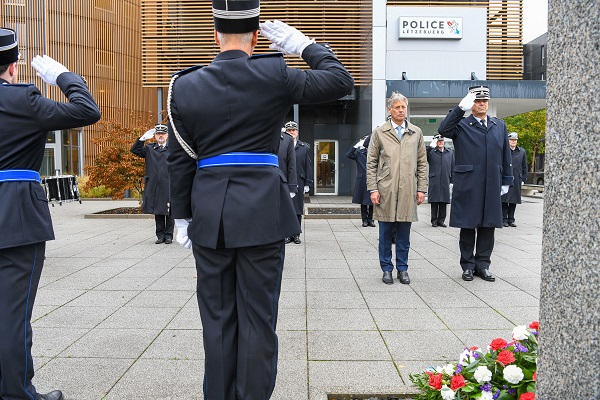 Henri Kox, Luxembourg's Minister for Internal Security, and Philippe Schrantz, Director General of the Grand Ducal Police;
Credit: Police Grand-Ducale
Henri Kox, Luxembourg's Minister for Internal Security, and Philippe Schrantz, Director General of the Grand Ducal Police;
Credit: Police Grand-Ducale
The Grand Ducal Police yesterday hosted their traditional Saint Michael reception, which took place this year in a reduced format due to the ongoing COVID-19 pandemic and in compliance with the sanitary measures in force.
Every year, the Grand Ducal Police celebrate Saint Michael's Day (29 September), in honour of the patron saint of police officers, firefighters and soldiers, with a reception. This year, the traditional reception bringing together members of the police, representatives of the Chamber of Deputies, the government, judicial authorities, foreign police and other Luxembourg administrations was abandoned in favour of a live broadcast of messages from the Director General of the Grand Ducal Police, Philippe Schrantz, and the Minister for Internal Security, Henri Kox.
In memory of the personnel who died on mission, wreaths were laid in front of the stele at the Grand-Duc Henri police station in Findel as well as at the public forces monument in "Kanounenhiwwel". A religious service was held at Saint Michael's Church in Luxembourg-Ville.
Minister Henri Kox highlighted the importance of continuing to adapt the police to the realities on the ground, as well as his own desire to support the police in their efforts to develop, modernise and diversify. The minister went on to advocate internal and external dialogue within the police force, particularly with unions and management, and hoped to find solutions for the recruitment of additional civilian and police personnel. He recalled this year's launch of the second phase of the recruitment campaign to attract more candidates, adding that the construction of a new police academy is in the pipeline.
In addition, the Minister of Internal Security stressed that a draft law on police files and data processing will be tabled in the autumn of this year, a bill which will take into account the balance between the rights of citizens in matters of protection of personal data and the efficiency of the work of the police. Amendments to the draft law for video surveillance will also be tabled in October.
In his speech, Philippe Schrantz pointed out the many challenges that the police have faced in dealing with the pandemic and in responding to the missions that were incumbent upon them during the state of emergency. He welcomed the fact that the structures put in place as part of the reform have made it possible to cope with it. He added that the agents carried out around 12,000 checks on compliance of measures taken in the context of the fight against COVID-19. The Director General also noted that the protective measures put in place within the police as well as the individual responsibility of members of the police have made it possible to limit the number of infections within the police body to three.
Philippe Schrantz also provided an update on crime statistics, which should be interpreted in the specific context of 2020. While some criminal activities have declined during the crisis, others have seen an increase, such as car thefts. There was also the phenomenon of parties organised in violation of COVID-19 provisions. The Director General added that drug-related crime handled by police officers remained constant compared to 2019.
Regarding mass recruitment within the police force, Philippe Schrantz recognised that this will pose certain challenges in terms of recruitment itself, training and the integration of young police officers within the units. Nevertheless, the police force could increase from 2,500 to more than 3,000 within a relatively short period of time as part of this process.
Finally, Philippe Schrantz highlighted the many efforts currently being made within the police in the context of data protection and digital transformation. The latter constitutes one of the main priorities of the management committee for the coming years and aims to put in place a common strategy in terms of police information technologies, a better IT architecture and a central portal allowing police officers to access both operational tools and internal information that directly concerns them.








